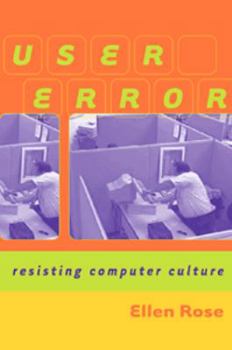User Error: Resisting Computer Culture
Select Format
Select Condition 
Book Overview
User Error explodes the myth of computer technology as juggernaut. Multimedia educator Ellen Rose shows that there is no bandwagon, no out-of-control dynamo, no titanic conspiracy to overwhelm us. Instead, there is our own desire to join the fraternity of users, a fraternity that confers legitimacy and power on those who enter the brave new world.
Rose exposes how we surrender decision-making power in personal and workplace computing situations. As users we willingly grant authority to the creators of software, support materials, and the seductive infrastructure of technocracy.
"Smart" users are rewarded; reluctant users are pathologized. User identity is deliberately constructed at the crossroads of industry, consumer demand, and complicity. User Error sounds a timely alarm, calling on all of us who use the new technologies to recognize how we are being co-opted. With awareness we can reassert our own responsibility and power in this increasingly important interaction.
Savvy, accessible, and up-to-date, User Error offers insight, inspiration, and strategies of resistance to general readers, technology professionals, students, and scholars alike.
Rose exposes how we surrender decision-making power in personal and workplace computing situations. As users we willingly grant authority to the creators of software, support materials, and the seductive infrastructure of technocracy.
"Smart" users are rewarded; reluctant users are pathologized. User identity is deliberately constructed at the crossroads of industry, consumer demand, and complicity. User Error sounds a timely alarm, calling on all of us who use the new technologies to recognize how we are being co-opted. With awareness we can reassert our own responsibility and power in this increasingly important interaction.
Savvy, accessible, and up-to-date, User Error offers insight, inspiration, and strategies of resistance to general readers, technology professionals, students, and scholars alike.
Format:Paperback
Language:English
ISBN:1896357792
ISBN13:9781896357799
Release Date:September 2003
Publisher:Between the Lines
Length:216 Pages
Weight:0.78 lbs.
Dimensions:0.5" x 6.1" x 9.0"
Customer Reviews
1 rating
Fascinating social insight, if awkwardly conveyed
Published by Thriftbooks.com User , 19 years ago
This is an illuminating study of the social hierarchy of computer knowledge and how the lowest class, the "User," was constructed. The author puts forth that technological advancement has, instead of liberating the User, subjected him to greater bondage as he becomes a slave to technology and a pawn in informational politics. Why are Users compelled to pursue needless upgrades? Is there really a need to expose children to technology in elementary school? What's behind the software makers' ostensible interest in their users' needs? These are among many questions that Rose addresses in her thought-provoking analysis. This book will be a revelatory read for many people who work directly with "end users" in the information technology field. This book is *not* for self-important technicians who already relentlessly despise the User for his ignorance -- if that's you (you know who you are), you will probably learn nothing here. But if you seek a deeper understanding of why people interact with technology the way they do, you'll gain a lot from this book. My main complaint is that the author employs long, burdensome sentences that make the book read like a thick college text. A more succinct style would have made it much more enjoyable.






